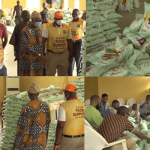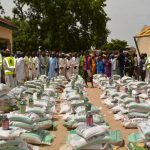More than 40,000 households across 80 rural communities in Taraba state have benefited from a project that has enhanced food security and improved livelihoods.
The six-year European union funded project was initiated to help improve access to resources for women, and farmers which in turn reduced poverty.
Over the years, the farmer herder’s crisis has largely affected food security leading to high costs in supply due to the dwindling availability of produce further made worse by rising inflation and climate change.
Taraba state has also been affected by the ongoing crisis which has left many indigenes displaced and unable to farm their crops.

In the last six years, succour has been brought to some of the farmers by giving 55 percent of women increased access to resources and empowered 35 percent of farmers especially women.
The project played a vital role in enhancing food security and improving livelihoods across 80 rural communities in the state which is now serves as a steppingstone for more future interventions across other states too.
This close out review meeting, dissemination and knowledge sharing between partners is geared to evaluate the project’s accomplishments, identify challenges encountered, and explore sustainable avenues for maintaining the positive outcomes achieved during the six-year implementation.
More than 40,000 households across 80 rural communities in Taraba state have benefited from a project that has enhanced food security and improved livelihoods.
The six-year European union funded project was initiated to help improve access to resources for women, and farmers which in turn reduced poverty.
Over the years, the farmer herder’s crisis has largely affected food security leading to high costs in supply due to the dwindling availability of produce further made worse by rising inflation and climate change.
Taraba state has also been affected by the ongoing crisis which has left many indigenes displaced and unable to farm their crops.

In the last six years, succour has been brought to some of the farmers by giving 55 percent of women increased access to resources and empowered 35 percent of farmers especially women.
The project played a vital role in enhancing food security and improving livelihoods across 80 rural communities in the state which is now serves as a steppingstone for more future interventions across other states too.
This close out review meeting, dissemination and knowledge sharing between partners is geared to evaluate the project’s accomplishments, identify challenges encountered, and explore sustainable avenues for maintaining the positive outcomes achieved during the six-year implementation.
More than 40,000 households across 80 rural communities in Taraba state have benefited from a project that has enhanced food security and improved livelihoods.
The six-year European union funded project was initiated to help improve access to resources for women, and farmers which in turn reduced poverty.
Over the years, the farmer herder’s crisis has largely affected food security leading to high costs in supply due to the dwindling availability of produce further made worse by rising inflation and climate change.
Taraba state has also been affected by the ongoing crisis which has left many indigenes displaced and unable to farm their crops.

In the last six years, succour has been brought to some of the farmers by giving 55 percent of women increased access to resources and empowered 35 percent of farmers especially women.
The project played a vital role in enhancing food security and improving livelihoods across 80 rural communities in the state which is now serves as a steppingstone for more future interventions across other states too.
This close out review meeting, dissemination and knowledge sharing between partners is geared to evaluate the project’s accomplishments, identify challenges encountered, and explore sustainable avenues for maintaining the positive outcomes achieved during the six-year implementation.
More than 40,000 households across 80 rural communities in Taraba state have benefited from a project that has enhanced food security and improved livelihoods.
The six-year European union funded project was initiated to help improve access to resources for women, and farmers which in turn reduced poverty.
Over the years, the farmer herder’s crisis has largely affected food security leading to high costs in supply due to the dwindling availability of produce further made worse by rising inflation and climate change.
Taraba state has also been affected by the ongoing crisis which has left many indigenes displaced and unable to farm their crops.

In the last six years, succour has been brought to some of the farmers by giving 55 percent of women increased access to resources and empowered 35 percent of farmers especially women.
The project played a vital role in enhancing food security and improving livelihoods across 80 rural communities in the state which is now serves as a steppingstone for more future interventions across other states too.
This close out review meeting, dissemination and knowledge sharing between partners is geared to evaluate the project’s accomplishments, identify challenges encountered, and explore sustainable avenues for maintaining the positive outcomes achieved during the six-year implementation.
More than 40,000 households across 80 rural communities in Taraba state have benefited from a project that has enhanced food security and improved livelihoods.
The six-year European union funded project was initiated to help improve access to resources for women, and farmers which in turn reduced poverty.
Over the years, the farmer herder’s crisis has largely affected food security leading to high costs in supply due to the dwindling availability of produce further made worse by rising inflation and climate change.
Taraba state has also been affected by the ongoing crisis which has left many indigenes displaced and unable to farm their crops.

In the last six years, succour has been brought to some of the farmers by giving 55 percent of women increased access to resources and empowered 35 percent of farmers especially women.
The project played a vital role in enhancing food security and improving livelihoods across 80 rural communities in the state which is now serves as a steppingstone for more future interventions across other states too.
This close out review meeting, dissemination and knowledge sharing between partners is geared to evaluate the project’s accomplishments, identify challenges encountered, and explore sustainable avenues for maintaining the positive outcomes achieved during the six-year implementation.
More than 40,000 households across 80 rural communities in Taraba state have benefited from a project that has enhanced food security and improved livelihoods.
The six-year European union funded project was initiated to help improve access to resources for women, and farmers which in turn reduced poverty.
Over the years, the farmer herder’s crisis has largely affected food security leading to high costs in supply due to the dwindling availability of produce further made worse by rising inflation and climate change.
Taraba state has also been affected by the ongoing crisis which has left many indigenes displaced and unable to farm their crops.

In the last six years, succour has been brought to some of the farmers by giving 55 percent of women increased access to resources and empowered 35 percent of farmers especially women.
The project played a vital role in enhancing food security and improving livelihoods across 80 rural communities in the state which is now serves as a steppingstone for more future interventions across other states too.
This close out review meeting, dissemination and knowledge sharing between partners is geared to evaluate the project’s accomplishments, identify challenges encountered, and explore sustainable avenues for maintaining the positive outcomes achieved during the six-year implementation.
More than 40,000 households across 80 rural communities in Taraba state have benefited from a project that has enhanced food security and improved livelihoods.
The six-year European union funded project was initiated to help improve access to resources for women, and farmers which in turn reduced poverty.
Over the years, the farmer herder’s crisis has largely affected food security leading to high costs in supply due to the dwindling availability of produce further made worse by rising inflation and climate change.
Taraba state has also been affected by the ongoing crisis which has left many indigenes displaced and unable to farm their crops.

In the last six years, succour has been brought to some of the farmers by giving 55 percent of women increased access to resources and empowered 35 percent of farmers especially women.
The project played a vital role in enhancing food security and improving livelihoods across 80 rural communities in the state which is now serves as a steppingstone for more future interventions across other states too.
This close out review meeting, dissemination and knowledge sharing between partners is geared to evaluate the project’s accomplishments, identify challenges encountered, and explore sustainable avenues for maintaining the positive outcomes achieved during the six-year implementation.
More than 40,000 households across 80 rural communities in Taraba state have benefited from a project that has enhanced food security and improved livelihoods.
The six-year European union funded project was initiated to help improve access to resources for women, and farmers which in turn reduced poverty.
Over the years, the farmer herder’s crisis has largely affected food security leading to high costs in supply due to the dwindling availability of produce further made worse by rising inflation and climate change.
Taraba state has also been affected by the ongoing crisis which has left many indigenes displaced and unable to farm their crops.

In the last six years, succour has been brought to some of the farmers by giving 55 percent of women increased access to resources and empowered 35 percent of farmers especially women.
The project played a vital role in enhancing food security and improving livelihoods across 80 rural communities in the state which is now serves as a steppingstone for more future interventions across other states too.
This close out review meeting, dissemination and knowledge sharing between partners is geared to evaluate the project’s accomplishments, identify challenges encountered, and explore sustainable avenues for maintaining the positive outcomes achieved during the six-year implementation.














